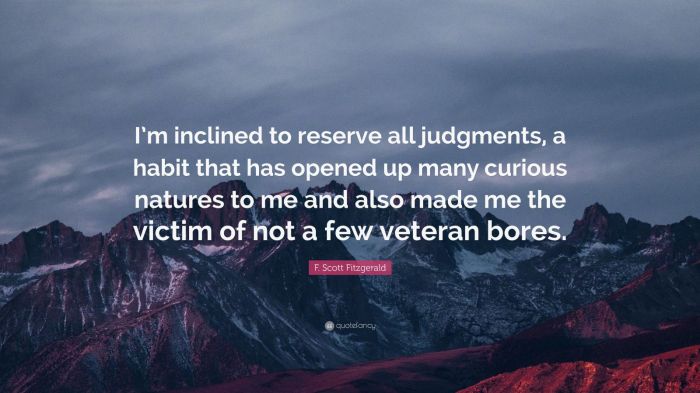In a world teeming with opinions and hasty judgments, the phrase ‘inclined to reserve all judgments’ stands as a beacon of critical thinking and open-mindedness. It encapsulates the importance of withholding opinions until sufficient evidence and diverse perspectives have been considered.
Reserving judgment is not about avoiding opinions altogether but rather about fostering a mindset that values informed decision-making and intellectual humility. By embracing this approach, we cultivate a more nuanced understanding of the world and make choices that are grounded in reason and empathy.
Understanding the Meaning of ‘Inclined to Reserve All Judgments’

The phrase ‘inclined to reserve all judgments’ indicates a disposition to withhold opinions or conclusions until sufficient evidence and information have been gathered and analyzed. It encompasses both the denotative meaning of suspending judgment and the connotative meaning of maintaining an open and unbiased mind.
Situations where reserving judgment is appropriate include:
- When encountering unfamiliar or complex issues.
- When faced with conflicting or incomplete information.
- When emotions or biases may cloud our objectivity.
Reasons for Reserving Judgment
Reserving judgment is crucial for several reasons:
- Avoiding biases and preconceptions:Hasty judgments can be influenced by our biases and preconceived notions, leading to inaccurate or unfair assessments.
- Gathering additional information:Reserving judgment allows us to seek out and consider additional information, ensuring that our conclusions are well-informed.
- Potential consequences of hasty judgments:Making judgments without sufficient information can have detrimental consequences, such as damaging relationships, perpetuating stereotypes, or hindering problem-solving.
Benefits of Reserving Judgment: Inclined To Reserve All Judgments
Reserving judgment offers numerous benefits:
- Fostering open-mindedness and critical thinking:By refraining from forming immediate judgments, we remain open to new perspectives and encourage critical analysis.
- Informed and balanced decisions:Gathering more information and considering diverse viewpoints leads to more informed and balanced decisions.
- Positive outcomes:Reserving judgment has led to positive outcomes in various fields, such as scientific research, legal proceedings, and conflict resolution.
Challenges of Reserving Judgment
Reserving judgment can be challenging due to:
- Resisting the urge to form opinions:Our minds are naturally inclined to make judgments, making it difficult to resist forming opinions even when information is limited.
- Social pressures:Societal expectations and peer pressure can influence our judgments, even if we are aware of our biases.
- Cognitive biases:Cognitive biases, such as confirmation bias and availability heuristic, can lead us to make hasty judgments based on limited or biased information.
Strategies for Reserving Judgment
To reserve judgment effectively, consider the following strategies:
- Mindfulness:Be aware of your thoughts and feelings, especially when encountering unfamiliar or challenging situations.
- Seeking diverse perspectives:Actively seek out and consider different viewpoints to broaden your understanding.
- Empathy and understanding:Practice empathy and understanding towards others, recognizing that their perspectives may differ from your own.
Exceptions to Reserving Judgment

While reserving judgment is generally advisable, there are exceptions:
- Emergencies:In life-threatening or urgent situations, it may be necessary to make a judgment without sufficient information.
- Ethical implications:In certain ethical dilemmas, reserving judgment may have negative consequences, such as allowing harm to occur.
- Irreparable consequences:When the potential consequences of a decision are irreversible or highly detrimental, it may be prudent to make a judgment with limited information.
Questions Often Asked
What does it mean to be inclined to reserve all judgments?
It means withholding opinions until sufficient evidence and diverse perspectives have been considered.
Why is it important to reserve judgment?
To avoid biases, gather more information, and make more informed decisions.
What are some challenges to reserving judgment?
Resisting the urge to form opinions quickly, social pressures, and cognitive biases.
What are some strategies for reserving judgment?
Mindfulness, seeking diverse perspectives, empathy, and understanding.
Are there any exceptions to reserving judgment?
Yes, when making a judgment without sufficient information is necessary, such as in emergencies.
